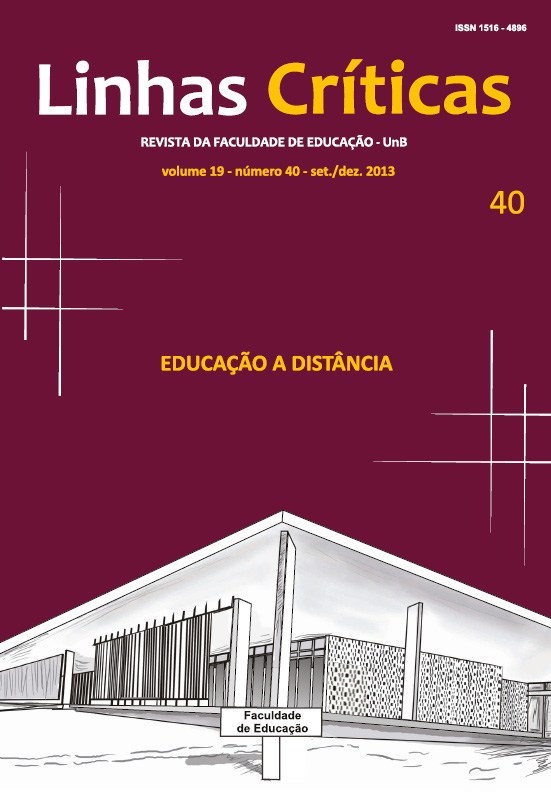Quality in education: unraveling the conceptual fabric in discourses
DOI:
https://doi.org/10.26512/lc.v19i40.4206Keywords:
Quality, Excellence, EducationAbstract
Quality in education is approached, in connection with excellence, a central theme of the 1980’s; in the context of the changes imposed by growing globalization, when the nations reached by the tentacles of world capitalism adopted strategic measures, as they accommodated to new needs. In this atmosphere, education is challenged to reach indices of excellence for the competent and competitive preparation of individuals in the technological society, of knowledge, and of continuous learning. This is an important concern of our time. Such relations demand studies for the “understanding” of the concepts and “interpretation” of the problems entangled in this complex of ideas.
Downloads
References
ARROYO, Miguel G. Fracasso-sucesso: o peso da cultura escolar e do ordenamento da educação básica. Em aberto, Brasília, INEP, v.11, n. 53, p. 46-63, jan. ”“ mar. 1992.
ASSMANN, Hugo. Pós-modernidade e agir pedagógico ”“ como reencantar a educação. In: Endipe, VII, 1996, Goiânia, Anais da VII Endipe, UFGO, 1996, p. 175.
BORRADORI, Giovanna. The american philosopher. Chicago & London: The University of Chicago Press, 1994.
BRASIL. MINISTÉRIO DE EDUCAÇÃO E DO DESPORTO. Parâmetros curriculares nacionais. Brasília: MEC/SEF, v. 1, 1998.
CREMIN, Lawrence. The transformation of the school ”“ progressivism in American education, 1876-1957. New York: Vintage Books Edition, 1964.
DAVIDSON, Donald. Subjective, intersubjective, objective. Oxford: Clarendon Press, 2001.
DEWEY, John. The child and the curriculum. In: O’NEIL, William F. Rethinking education. Dubuque, Iowa: Kendall/Hunt Publishing Company, 1983, p. 213-224.
FREIRE, Paulo. Pedagogia da autonomia. Rio de Janeiro: Paz e Terra, 1997.
HURWITZ, Sol. Civic partners: business and liberal education. Liberal education. Washington ”“ DC, Association of American Colleges and Universities, v. 68, n. 4, p. 323-328. 1982.
IOSIF, Ranilce M. Guimarães. A qualidade da educação na escola pública e o comprometimento da cidadania global emancipada: implicações para a situação de pobreza e desigualdade no Brasil. 2007. 310 f. Tese (Doutorado em Política Social). Universidade de Brasília, DF, 2007.
LIPMAN, Matthew. Filosofia na sala de aula. Tradução: Ana Luiza Fernandes Falcone. São Paulo: Nova Alexandria, 1994.
NODDINGS, Nel. Excellence as a guide to educational conversation. Philosophy of education Yearbook. Illinois: 1992. 12p. Disponível em: <http://jotamac.typepad.com/files/nel-noddings-_-excellence-as-a-guide-to-educational-conversation.pdf>Acesso em: 30 jul. 2013.
OZMON, Howard. Filosofia da educação: um diálogo. Tradução: Marco Aurélio de Moura Matos. Rio de Janeiro: Zahar Editores, 1975.
RORTY, Richard. Educação sem dogma. Tradução: José Lívio Dantas. Filosofia, sociedade e educação, Marília ”“ SP, UNESP, v. 1, n. 1, p. 69 ”“ 79, jul. 1997.
SENDOR, Elizabeth. Harness competition and hoopla to hook kids on academic excellence. The American school board journal. United States, National School Boards Association, 169, p. 17-20, jun. 1982.
SEVERINO, Antonio Joaquim. Epistemologia e ética da produção científica na atualidade latino-americana. Filosofia, sociedade e educação, Marília ”“ SP, UNESP, v. 2, n. 2, p. 87 - 96, ag. 1998.
SMITH, Stacy. Liberalism, Multiculturalism, and Education: Is there a Fit? Philosophy of Education Society website. Cornell University: 1995. 12p. Disponível em: <http://www.ed.uiuc.edu/EPS/PES-yearbook/95_docs/smith.html>. Acesso em: 30 jul. 2013.
TEIXEIRA, Anísio. Educação não é privilégio. São Paulo: Cia. Editora Nacional, 1971.USA Government. A nation at risk: the imperative for educational reform. Washington: US Government Printing Office, 1983. mimeografado.
Downloads
Published
How to Cite
Issue
Section
License
Copyright (c) 2016 Linhas Críticas

This work is licensed under a Creative Commons Attribution 4.0 International License.
Authors who publish in this journal agree to the following terms:
-Authors maintains the copyright and grants the journal the right of first publication, the work being simultaneously licensed under the Creative Commons Attribution License which allows the sharing of the work with recognition of the authorship of the work and initial publication in this journal.
- Authors are authorized to enter into additional contracts separately, for non-exclusive distribution of the version of the work published in this journal (eg publish in institutional repository or as a book chapter), with acknowledgment of authorship and initial publication in this journal.
-Authorers are allowed and encouraged to publish and distribute their work online (eg in institutional repositories or on their personal page) at any point before or during the editorial process, as this can generate productive changes as well as increase the impact and the citation of published work (See The Effect of Free Access).



